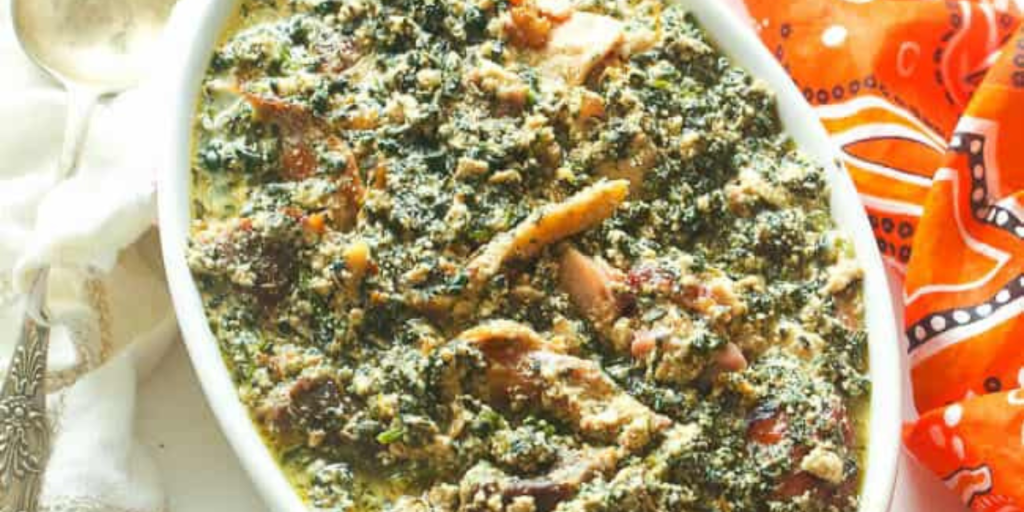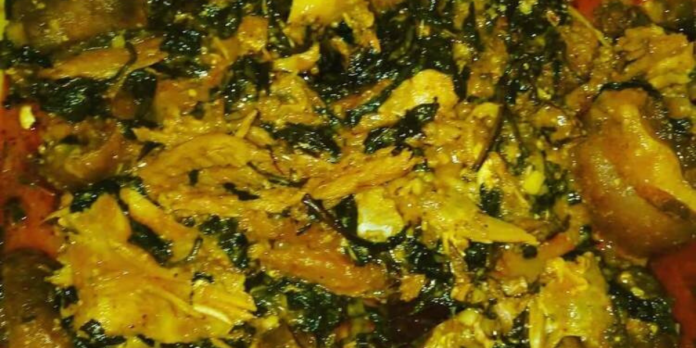Table of Contents
Nigerian Bitter leaf Soup
In the rich tapestry of Nigerian cuisine, few dishes hold as much cultural significance and culinary prowess as Bitter Leaf Soup. Renowned for its bold flavors, aromatic spices, and nourishing properties, this traditional West African dish has earned its place as a beloved staple in households across the region. But amidst the myriad variations and adaptations, one recipe stands out as the undisputed champion—the Number 1 Bitter Leaf Soup Recipe.
In this exploration of the quintessential Bitter Leaf Soup recipe, we embark on a journey through the vibrant flavors and cultural heritage that define this iconic dish. From its humble origins in Nigeria’s diverse culinary landscape to its status as a cherished symbol of community and tradition, Bitter Leaf Soup embodies the essence of West African cuisine in every savory spoonful.
But before we delve into the specifics of this esteemed recipe, it’s important to understand the significance of Bitter Leaf Soup in Nigerian culture. Known locally as “Ofe Onugbu” in the Igbo language, Bitter Leaf Soup holds a special place in Nigerian cuisine, revered for its medicinal properties, nutritional benefits, and deep-rooted cultural traditions.
At its core, Bitter Leaf Soup is a celebration of Nigeria’s rich biodiversity and culinary heritage. The star ingredient, bitter leaf, is harvested from the leaves of the Vernonia amygdalina plant, which grows abundantly throughout West Africa. Known for its distinctively bitter taste and vibrant green color, bitter leaf adds a unique depth of flavor to the soup, complemented by a medley of other ingredients such as meats, fish, vegetables, and spices.
Beyond its culinary appeal, Bitter Leaf Soup is also prized for its medicinal properties and health benefits. Bitter leaf is revered for its antioxidant, anti-inflammatory, and immune-boosting properties, making it a popular ingredient in traditional Nigerian medicine. When incorporated into Bitter Leaf Soup, these medicinal properties are thought to promote overall health and well-being, making it a nourishing and revitalizing dish for both body and soul.
But what sets the Number 1 Bitter Leaf Soup Recipe apart from the rest? In a culinary landscape teeming with variations and interpretations, this recipe stands out for its perfect balance of flavors, textures, and aromas. Crafted with care and attention to detail, the Number 1 Bitter Leaf Soup Recipe captures the essence of traditional Nigerian cuisine while incorporating modern twists and innovations to elevate the dish to new heights of culinary excellence.
At its heart, the Number 1 Bitter Leaf Soup Recipe is a testament to the artistry and ingenuity of Nigerian cooking. With its bold flavors, aromatic spices, and rich umami notes, this recipe offers a sensory experience that delights the palate and tantalizes the senses. From the earthy bitterness of the bitter leaf to the savory depth of the meats and spices, each ingredient plays a crucial role in creating a harmonious symphony of flavors that dance on the taste buds.
Moreover, the Number 1 Bitter Leaf Soup Recipe is more than just a culinary masterpiece—it’s a symbol of community, tradition, and shared heritage. In Nigerian culture, food is not just sustenance; it’s a form of social currency, a way to connect with loved ones, and a means of expressing cultural identity. Bitter Leaf Soup, with its roots in traditional Nigerian cuisine, serves as a powerful reminder of the importance of preserving and celebrating cultural heritage through food.
In the pages that follow, we’ll delve into the intricacies of the Number 1 Bitter Leaf Soup Recipe, exploring its history, ingredients, preparation methods, and cultural significance. Through firsthand accounts, expert insights, and step-by-step instructions, we’ll unravel the mysteries of this iconic dish and reveal the secrets to recreating its unforgettable flavors in your own kitchen.
So join us as we embark on this culinary journey through the heart and soul of Nigerian cuisine, celebrating the timeless tradition and enduring legacy of Bitter Leaf Soup—one savory spoonful at a time.

Bitter leaf soup – Afroro as it is called in Yala. Yala is a local government in Cross River State and I reckon you know the saying about Cross River State and dishes.
This is a very popular soup in Nigeria because almost all the regions in Nigeria prepares it and many people have different ways of preparing this delicacy.
This soup can be made with either egusi, achi or even ogbono and in this article, I am going to give a detailed explanation on how to prepare it with achi.
Bitter leaf soup, like most Nigerian soups is named after the leaf which is used in it’s preparation.
The bitter leaf needs thorough washing to remove almost all the bitterness.
In this recipe I am going to give a detailed explanation of how to make this soup to serve at least 10 people. You can add or reduce depending on how much or little you want your soup to be.
Ingredients For making Bitter leaf Soup
- 2kg cow or goat meat depending on your preference
- Bitter leaf (thoroughly washed)
- grounded Crayfish
- 3 to 5 seasoning cubes, depending on the type used
- Dry fish
- Palm oil (about 25cl)
- Stock fish
- Salt and pepper to taste.
- Achi, also known as thickener
Many Nigerian homes have this leaf growing in their compounds and can cut and wash but if you do not, you can get them at the market. It is always safer and hygienic to wash the leaves by yourself. Although it can be stressful and time consuming. You can buy washed bitter Leaves.
Bitter Leaf Soup Preparation

Step 1
With a knife, cut the bitter leaves in big chumps into abig morter and pound. Once it’s a bit pounded, start to wash and change water frequently until it’s ok.
To soften the leaves and further remove the bitter taste, it is advisable to boil
To eliminate the bitter taste, soak the meat and in water for 5 minutes.
Step 2
Next, use 2 seasoning cubes, a small amount of salt, and one medium-sized onion to parboil the meat. Boil for 10 minutes, then add water and continue cooking until the meat is tender.
Step 3
Add the (hot-water) washed dry fish, stockfish and cook until it is tender, add more water then ground crayfish, pepper, maggi seasoning, salt and pepper to taste. Stir and allow to boil.
At this point, it should give a good soupy taste ( Not withstanding Its watery state).
Step 4:
Take out all the meat from the pot and transfer it into a distinct bowl. This will enable the Achi to blend effectively without sticking to the meat or becoming lumpy.
Step 5:
Pour red oil into the soup and leave it to boil for some time.
Step 6:
Gradually include the ground Achi while continuously stirring the mixture.
If the soup is not thick enough, you may need to cook it for a bit longer until it reaches your desired thickness. Another option to thicken the soup is to add more Achi or water.
After you’ve added the bitter leaves in step seven, stir them in carefully until they’re fully mixed in with the soup. Sample the soup, and if necessary, add more salt to it. Once you’ve put the meat back in, continue cooking for a few minutes until it’s fully cooked. Once ready, serve the soup with Fufu, Eba Semo, or pounded yam.
In our culinary odyssey through the vibrant and diverse landscape of Nigerian cuisine, few dishes captivate the imagination and tantalize the taste buds quite like Bitter Leaf Soup. Emerging from the cultural tapestry of West Africa, this iconic dish is more than just a culinary creation—it is a celebration of tradition, heritage, and the rich bounty of the land. In our exploration of Bitter Leaf Soup, we have journeyed through its storied history, uncovered its tantalizing flavors, and delved into its profound cultural significance. As we reflect on our culinary expedition, we are reminded of the timeless allure and enduring legacy of this beloved dish.
At the heart of Bitter Leaf Soup lies a deep-rooted connection to the land and its people. Harvested from the leaves of the Vernonia amygdalina plant, bitter leaf serves as the cornerstone of this iconic dish, infusing it with its distinctive flavor and aroma. Revered for its medicinal properties and nutritional benefits, bitter leaf has been a staple in traditional Nigerian cuisine for centuries, prized for its ability to invigorate the senses and nourish the body.
But it is more than just a collection of ingredients—it is a testament to the ingenuity and resourcefulness of Nigerian cooks. Crafted with care and attention to detail, each batch of Bitter Leaf Soup is a labor of love, infused with the rich tapestry of flavors, textures, and aromas that define Nigerian cooking. From the earthy bitterness of the bitter leaf to the savory depth of the meats and spices, every ingredient plays a crucial role in creating a symphony of flavors that dance on the palate and tantalize the senses.
In our exploration of Bitter Leaf Soup, we have also uncovered its profound cultural significance. Known locally as “Ofe Onugbu” in the Igbo language, Bitter Leaf Soup is deeply ingrained in Nigerian culture, serving as a symbol of community, tradition, and shared heritage. Whether enjoyed at family gatherings, religious ceremonies, or festive celebrations, Bitter Leaf Soup brings people together in a spirit of camaraderie and kinship, forging bonds that transcend generations and unite communities in celebration of life’s simple pleasures.
But perhaps what sets Bitter Leaf Soup apart is its ability to adapt and evolve with the times. While rooted in tradition, this iconic dish has undergone countless iterations and adaptations over the years, reflecting the diverse influences and culinary innovations that shape Nigerian cuisine. From modern twists on classic recipes to innovative fusion dishes that blend traditional flavors with contemporary techniques, Bitter Leaf Soup continues to captivate and inspire a new generation of cooks and food enthusiasts.
But beyond its culinary appeal, Bitter Leaf Soup is also a symbol of community, connection, and cultural identity. In Nigerian culture, food is more than just sustenance; it’s a way of bringing people together, celebrating shared heritage, and forging bonds that transcend borders and boundaries. Bitter Leaf Soup, with its roots in traditional Nigerian cuisine, serves as a powerful reminder of the importance of preserving and honoring cultural traditions through food.
In our quest to uncover the secrets of Bitter Leaf Soup, we have also discovered its myriad health benefits. Rich in vitamins, minerals, and antioxidants, bitter leaf is revered for its medicinal properties, believed to promote overall health and well-being. When incorporated into Bitter Leaf Soup, these healthful properties are thought to boost the immune system, aid in digestion, and promote detoxification, making it a nourishing and revitalizing dish for both body and soul.
As we bid farewell to our culinary expedition through the world of Bitter Leaf Soup, we are left with a deep appreciation for the rich tradition, vibrant flavors, and profound cultural significance of this beloved dish. From its humble origins in the heart of West Africa to its status as a cherished staple in households around the world, Bitter Leaf Soup serves as a testament to the enduring legacy of Nigerian cuisine and the timeless allure of its culinary treasures.
As we continue on our culinary journey through the rich and diverse landscapes of Nigerian cuisine, let us carry forward the lessons learned and the flavors savored, embracing the richness and diversity of this vibrant culinary tradition with open arms. Whether enjoyed in the comfort of our own homes or shared with loved ones around the table, Bitter Leaf Soup reminds us of the power of food to nourish the body, uplift the spirit, and unite communities in celebration of life’s simple pleasures. Do not give Up The Chance To Try The Recipe When You Can.





















